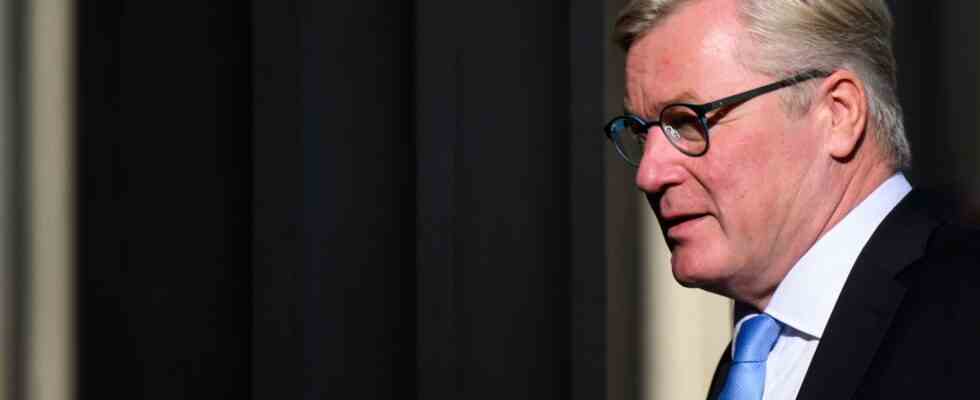Status: 06.10.2022 10:49 a.m
Daniel Günther, Hendrik Wüst, Bernd Althusmann? The CDU top candidate wants to continue his party’s successful campaign in Lower Saxony. In the election campaign, he is unusually aggressive. But is that enough?
He wants to know again: after the CDU narrowly lost to the SPD in the 2017 state elections, Bernd Althusmann ran again. With a clear goal: He wants to become Lower Saxony’s new prime minister. It’s time for a leadership change.
The CDU top candidate is touring through Lower Saxony for this. Instead of a suit, he wears jeans and white sneakers, the sleeves of his shirt are rolled up – his new uniform. With him was his campaign vehicle – an American Airstream caravan.
“That will not do”
Althusmann stands with him on the market square in Peine on a Monday in September. The sun’s rays reflect on the aluminum body of his Airstream – and the CDU’s top candidate reflects on federal politics. He has lost his confidence in the ability of this federal policy to act, he calls into the microphone. People need relief in the energy crisis and he wants to be the one who clearly says to the traffic light government: “It doesn’t work that way”. The nuclear power plants must continue to run, he says. This is the only way to secure the energy supply. Some listeners clap – the majority do not.
Althusmann’s mood against the traffic light government in Berlin doesn’t really want to be transferred to the masses. Maybe it’s because he’s performing in an SPD stronghold. Historically speaking, CDU candidates in Peine, a town east of Hanover, have had a hard time asserting themselves against the social democratic competition. Perhaps it is also because the CDU was part of the federal government for a long time. “You messed up Germany for 16 years,” shouts a listener to the crowd, alluding to the tenure of former Chancellor Angela Merkel (CDU).
Energy crisis, poverty, inflation
The crisis calls for new perspectives: In the state election campaign, state political issues have long been pushed into the background. Election programs written months ago hardly get any attention, because what is moving are federal issues: energy crisis, poverty and inflation. The CDU understood that too. Your strategy: criticism of the traffic light coalition in Berlin.
Wherever possible, the party works its way through the government. But the course is not well received by some voters – and some party members are also critical. Some say privately that they worry this alignment may be wrong. That the election cannot be won with criticism of federal politics alone.
Concerns about popularity ratings
In the most recent representative survey by Infratest dimap for the NDR the CDU is 28 percent, the SPD 32. But it is not the difference of four percentage points that worries the Christian Democrats in Lower Saxony, but the popularity of their top candidate. Because nothing is happening there. Only 27 percent of those surveyed would directly elect Althusmann as prime minister.
Incumbent Stephan Weil from the SPD, on the other hand, has 49 percent. But Althusmann doesn’t pay much attention to the values. “I’m not impressed by these numbers,” he says.
He is aggressive because he wants to be among the winners. Hendrik Wüst won the election in North Rhine-Westphalia, Daniel Günther in Schleswig-Holstein – Althusmann could be the third Christian Democrat in the league. He has been preparing for victory since the 2017 state elections.
Buttoned up and distant?
As Economics Minister of Lower Saxony, he set the course in the grand coalition with the SPD: During the pandemic, he initiated aid totaling more than six billion euros for Lower Saxony companies, put together his own state programs for the catering industry, and thereby earned respect in the community Business. But not everyone finds access to Althusmann easy – it is said that he is too buttoned up, too distant, too little tangible and sometimes too little on topic. He may have accepted this criticism: In the course of the election campaign, he became increasingly aggressive and came across as much more open.
The people in the Lower Saxony town of Peine, on the other hand, are less concerned with political calculations than with the question of how education can work in Lower Saxony and what role special schools play in this. A mother is convinced: “Red-Green wants to take away our freedom of choice.” It’s about the “Lernen” special needs school, which is to be closed in Lower Saxony by 2028. Children with special needs should be taught in mainstream schools in the future.
Althusmann, who was Minister of Education from 2010 to 2013, makes it clear: “With a CDU-led state government, there will be no abolition of special schools.” There shouldn’t be any ideological compulsion to “force children into a school system even though the prerequisites” aren’t there.
There is a problem with digitization
But education is also about digitization. And that’s where things get stuck in Lower Saxony – the pandemic has shown that: 24 percent of the schools in Lower Saxony still don’t have high-performance WiFi. Not even every third school has a fiber optic connection. Critical voices say that Althusmann, as economics and digitization minister, would have been responsible for exactly that. By the end of 2021, only 50 percent of the billion that the country had made available for digital expansion had been accessed. The Ministry assures that further funds are planned.
Should he become prime minister, Althusmann wants to set up his own digitization ministry. This announcement raised questions for many: Did the Economics Minister not manage to bring Lower Saxony digitally into the future?
Whatever the answer to this question, should Althusmann prevail in these state elections, he will have major tasks to master as prime minister – and they certainly go beyond mere criticism of the traffic light government.

